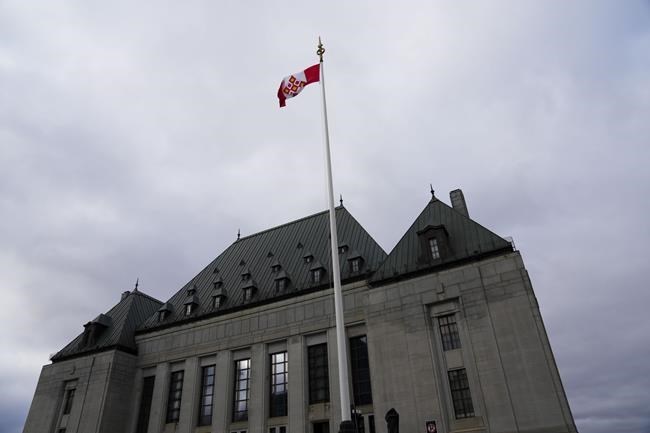OTTAWA — The Supreme Court of Canada has upheld a man's drug-related conviction, saying evidence in his case is admissible despite concerns about violation of his Charter rights.
In February 2017, near Banff, Alta., a police officer pulled over George Zacharias's truck because the windows were illegally tinted and a light wasn't working.
Several factors led the RCMP constable to suspect drug activity, court documents show.
The officer was aware of Highway 1 to Calgary as a known corridor for transporting drugs.
Zacharias said he was going to visit his sister for just a couple of days but had a large suitcase in the cab of the truck. The fact the luggage was in the cab suggested the back of the truck was full.
Zacharias seemed extremely nervous when he handed over his identification. In addition, a decal sticker on one of the truck windows reading "back the blue" struck the constable as suspicious because drug traffickers commonly displayed messages of support for police.
Upon running Zacharias's name through police databases, the officer learned that three years earlier, someone had complained he was involved in distributing large amounts of cannabis and cocaine.
The officer called in backup support and a sniffer dog.
The dog signalled the presence of drugs, prompting the constable to arrest Zacharias for possession of a controlled substance.
A search of the truck turned up a large amount of cannabis and cash, and Zacharias was re-arrested for possession for the purpose of trafficking.
He was then driven to a police detachment, searched and arrested a third time for possession of proceeds of crime over $5,000.
The trial judge concluded the constable did not have reasonable suspicion to detain Zacharias and deploy a sniffer dog, noting the unknown reliability of the police database entry from 2014.
As a result, the judge found police had breached Zacharias's Charter rights to be protected from unreasonable search and seizure and arbitrary detention. But the judge admitted the evidence on grounds that excluding it would bring the administration of justice into disrepute.
Zacharias appealed his conviction of possession of cannabis for the purpose of trafficking, arguing the trial judge mistakenly failed to consider the consequences that flowed from the Charter breaches.
The Alberta Court of Appeal dismissed his challenge.
Three of the five Supreme Court of Canada judges who reviewed the case said Zacharias's appeal should be dismissed. However, there were two sets of reasons Friday for arriving at that conclusion.
In their reasons, justices Malcolm Rowe and Michelle O'Bonsawin said authorities could not rely on the evidence unlawfully obtained from the sniffer dog search to satisfy the reasonable and probable grounds requirement for Zacharias's subsequent arrests.
Because the first arrest was unlawful, the ensuing searches and the second and third arrests constituted breaches of his Charter rights, they said.
However, Rowe and O'Bonsawin pointed out the question of whether there has been a violation of the Charter is distinct from whether the evidence obtained as a result of that violation should be excluded from trial.
The latter question is addressed through another section of the Charter, where the court considers the totality of the circumstances in order to determine, on balance, whether admission of the evidence will bring the administration of justice into disrepute, they noted.
In determining whether evidence in question should be excluded, a court looks at the seriousness of the state conduct in breaching the Charter, the effect of the breach on the accused and society's interest in adjudicating the case on its merits.
Ultimately, Rowe and O'Bonsawin found the overall circumstances favoured admission of the evidence.
In concurring reasons, Justice Suzanne Côté agreed that Zacharias's appeal should be dismissed.
She said, however, that the focus of the analysis concerning admission of evidence should be on the detention of Zacharias while awaiting arrival of the dog for the sniffer search.
The presence of additional breaches was not argued at trial and has little, if any, impact on the analysis, she said.
This report by The Canadian Press was first published Dec. 1, 2023.
Jim Bronskill, The Canadian Press




